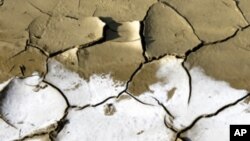A top U.N. advisor said on Friday that every minute, 23 hectares of land are degraded by drought and desertification. He said it’s damaging the economic, social and environmental pillars needed for sustainable development.
Luc Gnacadja, executive secretary of the U.N. Convention to Combat Desertification, the UNCCD, was among those attending a meeting in the southwestern Algerian town of Tinerkouk. The meeting marked the Decade for Deserts and the fight against desertification.
Speaking from Tinerkouk – a desert area – Gnacadja said natural desert ecosystems are valuable and must be conserved – but man-made deserts must be avoided. He warned that land degradation – also known a desertification – is a global problem.
“It is undermining our capacity to address the issue of poverty, our capacity to mitigate climatic drought,’ he said.
A blind spot
Land degradation,’ he said, threatens aquifers that are needed for biomass – a mass of biological organisms living in a particular area. It also increases environmentally induced migration and puts food security at risk. He called the protection of arable land a “blind spot” in the climate change debate.
“The peel of that land that we call soil is the most nonrenewable resource that we have to generate food, to generate the forest that we depend on to regulate the atmosphere. And we depend on it to reduce the runoff and increase what they call green water for biomass production,” he said.
And a lot of soil is lost every year.
“Now, globally speaking, we’re losing 12 million hectares of productive land. We’re losing them every single year due to drought and desertification. 12 million hectares. It is even more than the size of my country, Benin,” he said.
Hard hit continent
Gnacadja said managing every inch of the fertile soil available matters “much more than ever before.” The U.N. Food and Agriculture Organization warns that Africa could be particularly hard hit.
“If the trend of degradation in Africa continues,” he said, “Africa may lose two-thirds of its arable land by 2025. This will make it impossible for the continent to reach food security when you know that the continent is the fastest growing region population-wise in the world.”
He said progress against land degradation is being made on the grassroots level through better farming techniques. But those achievements need to be enhanced and scaled up in all parts of the world. The head of the U.N. Convention to Combat Desertification said climate change negotiations must include land protection. He added when land is protected everyone wins.




